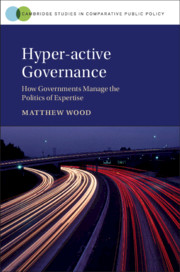Book contents
- Hyper-active Governance
- Cambridge Studies in Comparative Public Policy
- Hyper-active Governance
- Copyright page
- Contents
- Figures
- Tables
- Boxes
- Preface
- Acknowledgements
- Abbreviations
- Part I Introducing Hyper-active Governance
- Part II Hyper-active Governance in Practice
- 3 Defence
- 4 Empowerment
- 5 Inclusion
- 6 Defend, Empower and Include
- Part III Theorising Hyper-active Governance
- Book part
- Notes
- References
- Index
5 - Inclusion
Water Resource Governance
from Part II - Hyper-active Governance in Practice
Published online by Cambridge University Press: 21 June 2019
- Hyper-active Governance
- Cambridge Studies in Comparative Public Policy
- Hyper-active Governance
- Copyright page
- Contents
- Figures
- Tables
- Boxes
- Preface
- Acknowledgements
- Abbreviations
- Part I Introducing Hyper-active Governance
- Part II Hyper-active Governance in Practice
- 3 Defence
- 4 Empowerment
- 5 Inclusion
- 6 Defend, Empower and Include
- Part III Theorising Hyper-active Governance
- Book part
- Notes
- References
- Index
Summary
The previous chapters have sought to map and explain dynamics of contemporary governance in which governments have relied upon experts to govern complex policy problems but have taken a ‘hands-on’ rather than ‘hands-off’ approach – ‘hyper-active governance’. The dynamics were summarised through the terms ‘defence’ and ‘empowerment’. This chapter focuses on a third style, which is termed ‘inclusion’. This style of governance refers to how governments may rally popular opposition to a policy explicitly designed to be made by experts. Expert-driven decisions are not politically uncontentious, and the fallout of expert-led policy processes can be a societal backlash if they are seen as unnecessarily biased or unfair. Governments sometimes side with society in the backlash and demand that experts revise their decisions to take account of public opinion. Examples of this style can be found in areas where ethical concerns are important and experts are seen to have failed to listen to public opinion. Alternatively, big infrastructure projects like high-speed rail links often lead to politicians criticising experts where their advice has led to houses needlessly being bulldozed. In such instances, politicians often build in mechanisms for public input into decision-making, often through extensive consultation and ‘stakeholder engagement’ processes.
- Type
- Chapter
- Information
- Hyper-active GovernanceHow Governments Manage the Politics of Expertise, pp. 139 - 164Publisher: Cambridge University PressPrint publication year: 2019

